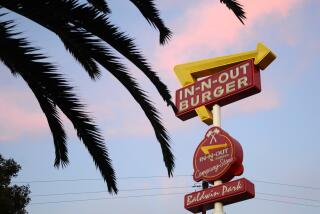Wall Street Devours News That Carl’s Jr. Is Dishing Up New Entrees, Interior Design
- Share via
Carl Karcher Enterprises is sprucing up its Carl’s Jr. restaurants with new signs, fresh paint and an interior motif the Anaheim-based company calls “homey and bright.”
And back in the kitchen, Carl’s is serving up a country-fried steak sandwich that one restaurant industry analyst claims is better than home-cooked.
The extra effort is not going unnoticed on Wall Street, where Karcher shares have taken on their own sizzle in recent days.
Karcher closed Friday at $13.625 per share, up $2.125 for the week. The 18.5% increase is more than triple the 5.7% gain posted by the Dow Jones Industrial Average, which rose 100.3 points to finish the week at 1867.04.
Analysts speculated that institutional investors have been snapping up shares in response to comments by Karcher executives, who spent several days earlier in the month meeting with East Coast financial analysts.
“They had very good news, and investors haven’t been hearing a lot of that lately,” said James Murren, a restaurant analyst at Cyrus J. Lawrence, a New York securities firm.
In their presentations to the investment community, Karcher executives spoke of menu additions and restaurant renovations that already are boosting company profits.
Karcher earned $11.8 million during the first nine months of its 1988 fiscal year, which ends in January. This year’s profit compares to earnings of $4.2 million during the same period in fiscal 1987. Sales for this year’s nine-month period were $280.7 million, up from $240.8 million a year earlier.
The company posted a $7.1-million loss for fiscal 1987, but much of the deficit came from a one-time $15-million reserve set up during the fourth quarter for costs incurred in the closing of 27 company-owned restaurants.
Analysts said Karcher investors and Carl’s Jr. customers are being attracted by the same factors: quality and price.
“Carl’s is, first off, a basic company, and now they’re concentrating on their basics,” said Paul Salazar, an analyst at the Los Angeles brokerage of Crowell, Weedon & Co.
Earlier this year, the company introduced an “all-you-want” beverage bar at its restaurants. The idea has boosted soft-drink sales while lowering labor costs, which have spiraled in the labor-scarce Southern California fast-food market.
Another addition is the country-fried steak sandwich, which sells for $1.95 at many Carl’s Jr. restaurants. Murren said the new entree accounts for as much as 9% of sales at many restaurants.
Roast beef sandwiches and packaged salads are expected to be introduced next, and several analysts expect them to be hot sellers.
Although the fourth quarter is typically weak for the company, Murren said many of Karcher’s 436 Carl’s Jr. restaurants have logged record sales in recent weeks.
Murren expects Karcher to report fiscal 1988 earnings of $16.3 million, or $1.40 per share. Salazar projects $14 million, or $1.20 per share. The company has 11.7 million shares outstanding.
For fiscal 1989, which begins in February, the analysts expect earnings of about $19.9 million, or $1.70 per share.
Murren said the company will benefit from the ongoing refurbishing program and the planned addition of about 35 new restaurants in established markets during each of the next three years.
Even if overall consumer spending slows, Carl’s Jr. restaurants should be less affected than many eating establishments because of their low-cost fare, analysts said.
“Investors are looking at companies that are going to do well even if the economy doesn’t do so well. Carl’s is a good bet,” said Tom Caraisco, a restaurant industry analyst at Henry F. Swift & Co., a San Francisco brokerage.
Murren said he is “strongly recommending” purchases of Karcher stock. He predicted that Karcher shares could trade above $20 in the next few months.
Barry Ziegler, a restaurant industry analyst at the New York brokerage of Tucker, Anthony & R.L. Day, said the stock is undervalued and recommended that current owners hold their shares.
Analysts predicted that Karcher will do well as long as it continues to do what it does best.
“Carl’s is an innovator, and they’ll do that best if they stay very much as they are and don’t try to get so awful big,” Caraisco said.
Karcher appears to have learned that lesson the hard way. Several years ago, the chain embarked on a major expansion into new markets and introduced an upscale menu featuring non-traditional fare such as grilled rainbow trout. The strategy proved unsuccessful, and Karcher eventually abandoned it.
“They tried for the coffee shop market, which isn’t what they do best,” Salazar said.
The company cut its losses by selling off many of its restaurants outside of Southern California and returned to a business strategy emphasizing burgers, fries, soft drinks--and low prices.
More to Read
Inside the business of entertainment
The Wide Shot brings you news, analysis and insights on everything from streaming wars to production — and what it all means for the future.
You may occasionally receive promotional content from the Los Angeles Times.










